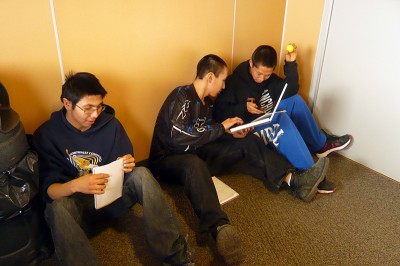In remote Alaskan villages, teachers struggle to make school meaningful

Wagner Iworrigan, a 17-year-old high school senior on St. Lawrence Island in Alaska, knows a lot about biology, meteorology, and math. He’s an expert at telling whether a walrus is too sick to eat, if the weather is likely to turn dangerous, and the best angle for throwing a harpoon at a surfacing bowhead whale. On a recent unseasonably warm day last fall, he skipped class to join his uncle on their boat. With nets and hooks, they motored through the choppy gray waves of the Bering Sea until the lights of their village, Savoonga, seemed farther than the stars above. They hoped to catch a seven-foot halibut or plump seal to feed the rest of the family: Wagner’s two younger sisters, a younger brother, four cousins, and a grandfather. All 10 of them share a three-bedroom house. Wagner might make a good scientist, but he’s not planning on going to college. He feels
